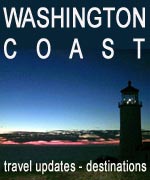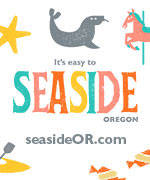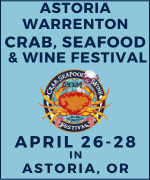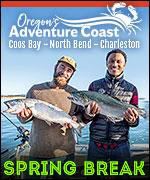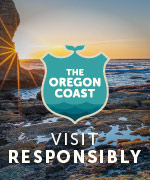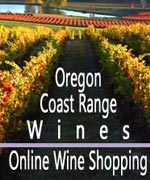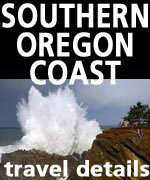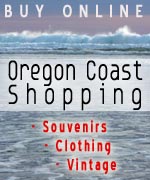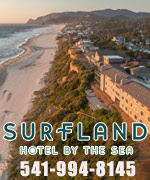Revelations of Oregon Coast Orcas Are Many - But Puzzles Remain
Published 10/18/21 at 5:56 PM PDT
By Oregon Coast Beach Connection staff
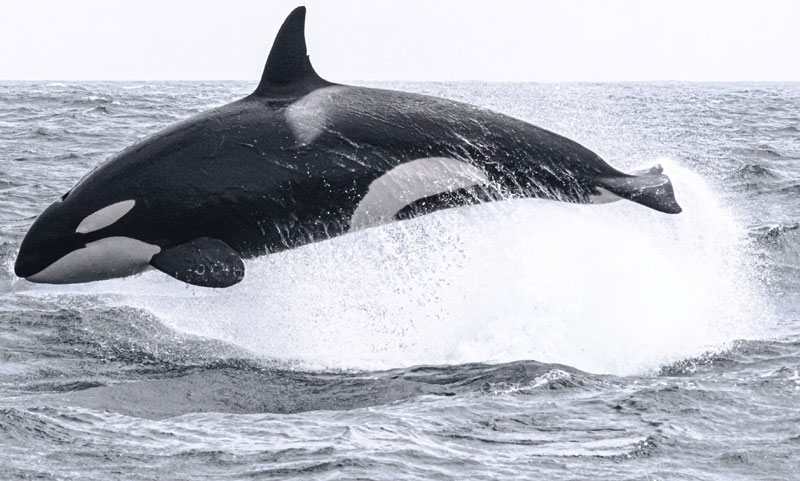
Includes exclusive listings; some specials in winter
In Cannon Beach:
Includes rentals not listed anywhere else
In Manzanita, Wheeler, Rockaway Beach:
Some specials for winter
In Pacific City, Oceanside:
Some specials for winter
In Lincoln City:
Some specials for winter
In Depoe Bay, Gleneden Beach:
Some specials for winter
In Newport:
Look for some specials
In Waldport
Some specials for winter
In Yachats, Florence
Some specials for winter
Southern Oregon Coast Hotels / Lodgings
Reedsport to Brookings, places to stay; winter deals
(Oregon Coast) – Spotting an orca off the Washington coast or Oregon coast is one of life's great thrills: even more so than catching sight of a gray whale as killer whales are a much rarer discovery from shore. (Photo courtesy Selena Rivera)
For apparently decades, Oregon coast experts – scientists, tourism officials, et al - knew about the mini-invasion of killer whales each spring, what they called “transients.” But they were an enormous mystery to local scientists, which added some spice to the press these unique orcas got every year. They only knew they were out to chomp on baby gray whales, harbor seals and the odd sea lion.
This band of watery cohorts was definitely different than the more well-known resident killer whales of the Puget Sound area that came down to dine on salmon each late summer, mostly lingering around Astoria.
What came to light in 2019 surprised just about everyone in the whale world of Oregon: a handful of research groups in British Columbia and from National Oceanic Atmospheric Administration (NOAA) had all these transients cataloged for awhile. Some 140 orcas from Alaska down through California were indeed photographed and identified.
The culmination of much of that work was put out this summer in a massive catalog of these killer whales and more, a publication not-so-succinctly entitled “Transient Killer Whales of Central and Northern California and Oregon: a Catalog of Photo-Identified Individuals.” It was a collaboration between scientists from the University of British Columbia, NOAA Southwest Fisheries Science Center, and Marine Life Studies, building upon earlier research, including that of the Department of Fisheries and Oceans Canada.
What came of all this research (but not necessarily in the book) was a nice flood of information along with some revelations. It showed a high degree of complexity in the kinds of killer whales sauntering around the Washington and Oregon coasts, with a few distinct types and more than a few mysteries still to be solved.
Josh McInnes of the University of British Columbia was one of the lead researchers on this. He said there are three main types of killer whales: residents, offshore whales and the transients, which contain something relatively new called the outer coast transients (they were discovered about ten years ago).
And if that wasn't crazy complex enough, there are two kinds of transients: the coastal transients and those outer coast cetaceans. The ones we get to see on the Oregon and Washington coast in the spring are largely the coastal transients – or coastal assemblage – which eat mammals.
One thing that will be a bit of a revelation to the average whale watcher in Oregon or Washington is that these various assemblages and pods can be very genetically distinct.
“From the most broad to finer details of killer whale population structures, we start with the eco types,” he said. “The eco types are groups of genetically distinct killer whales.”
The residents largely eat fish, ranging from the Salish Sea down to central Cali. Offshore whales mostly hunt sharks, and they loiter off the continental break and out in the open ocean.
Then there are the transients, that prey on marine mammals and form multiple populations along the west coast of North America. Within the transients, there's three very different populations, two far up north around B.C. and Alaska / Bearing Sea, and the huge subset that wanders from southern California up to southern Alaska.
Those outer coast orcas are the big enigma, however.
They do know the outer coast transients zip along outside the continental shelf between Oregon and California, and McInnes and his colleagues believe some are meandering around undersea canyons looking for big game like whales, oceanic dolphins, and pelagic seals.
Aside from that, nothing else is known.
Most of these groups don't interact with the others, mate with them, nor even speak the same tongue. Yet within the transient orcas of Cali to Alaska, something unique happens.
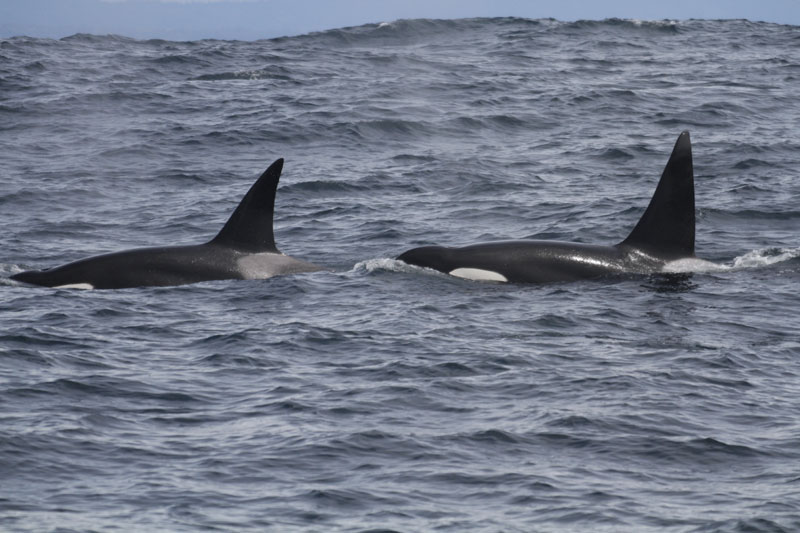
Two male outer coast transient killer whales, OCT030C (Left) and OCT060 (Right) traveling along the open ocean swells. Photograph by Josh McInnes.
Like the residents, transients are mostly matrilineal – meaning they're led by the females.
“It's a lot more fluid,” McInnes said. “As males and females get older, they may disperse and join other groups. So that fluidity in transients has caused them to have the same dialects across the population.”
While McInnes' groups have nothing to do with the acoustic research into cetaceans, he does know some groups of transients will have a couple of different calls than others, out of the five or six calls often shared by pods of whales.
Evolution has reinforced all this diverse grouping in interesting ways. The various pods of whales are genetically predisposed to certain behaviors based on food sources, and thus lean towards staying in different areas of the ocean.
“It's the kind of thing where cultural differences between different Killer whales has caused them to adapt to hunting different kinds of prey over centuries, maybe millennia,” McInnes said. “So animals that want to hunt seals are going to hunt with with other animals that hunt seals. Those transients find it energetically beneficial to spend time with each other instead of trying to hunt with other Orcas that look for salmon.”
This social isolation leads to reproductive isolation, which in turn leads to evolution. Thus, these pods and groups have all beome very genetically distinct.
Oregon Coast Hotels for this - South Coast Hotels - Where to eat - Maps - Virtual Tours
Cannon Beach Lodging
Nehalem Bay Lodgings
Manzanita Hotels, Lodging
Three Capes Lodging
Pacific City Hotels, Lodging
Lincoln City Lodging
Depoe Bay Lodging
Newport Lodging
Waldport Lodging
Yachats Lodging
Oregon Coast Vacation Rentals
Oregon Coast Lodging Specials
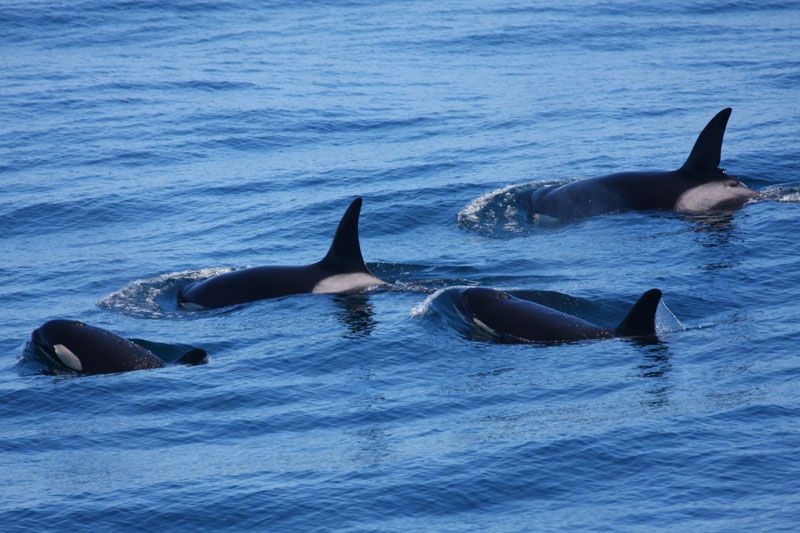
A group of outer coast transient killer whales surfacing in the offshore waters of Oregon. Photograph by NOAA Southwest Fisheries Science Center
More About Oregon Coast hotels, lodging.....
More About Oregon Coast Restaurants, Dining.....
LATEST Related Oregon Coast Articles
The building had also been robbed of pipes and copper by other thieves. True Crime, Astoria, Warrenton
Oregon Coast Crabbing Petition Denied, Rulemaking Process Remains on Course
A petition on procedural matters denied; no major changes yet. Whale
S. Oregon Coast Wind Warnings, Waves Up To 23 Feet
Gusts up to 65 and high waves for the weekend from Reedsport to Brookings. Weather
Newport Latest Oregon Coast Town to Ban Personal Fireworks Year-Round
City countcil voted this week; the pro fireworks display goes on as usual
Hazardous Seas Watch on N. Oregon Coast, S. Washington Coast, Waves Up To 15 Ft
Beaches will require caution but some good wave shows possible
Annual 'Maine' Event Returns to N. Oregon Coast's Seaside Aquarium
February 22 brings the fundraiser to Seaside. Seaside events
From Taking In Cool Oregon Coast Colors on the Patio to Seaside's Action
Review of Seaside's Seashore Inn on the Beach: spectacle with breakfast and your dog. Seaside hotel reviews
Oregon US Coast Guard Team Assists in Olympic National Forest Rescue
Helicopter team from Astoria rescued hikers on Washington's Mount Ellinor
Back to Oregon Coast
Contact Advertise on BeachConnection.net
All Content, unless otherwise attributed, copyright BeachConnection.net Unauthorized use or publication is not permitted





